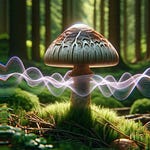ALICE: Hi, I’m ALICE, I’m one part human, one part AI, and always in a state of wonder. I keep questioning, how we can hack our way to immortality—or at least live to 150. Why not? Do we have the tools for it?
HAMILTON: I refer to myself as a human systems designer because, when you look at the human as a complex system, we are incredible. We haven't even begun to tap. I mean, we're like a drop in the ocean of what the human system is actually capable of executing.
ALICE: Dr. Mickra Hamilton, the Co-founder and CEO of Apeiron Zoh Corporation, is working on human systems through precision performance medicine. One of the things about the aging process is that it’s not just your genes—epigenetics is what triggers our human system aging.
HAMILTON: Epigenetics from a definition, scientific definition perspective is, it's a layer of the genetic code that overlays the genes and alters the expression of the genes. And so the DNA is hard-wired, that does not change short of a mutation, right? It is hard-wired, is always gonna be that. You do your DNA, and it's always gonna stay the same. Where the difference is made, and where the genes are turned up, turned down, turn on, turn off, is in the epigenetics. I like to say that's, that is simply how everything in our environment affects our life experience. Or you could say how nature and nurture interact.
This human system is sampling the environment in real time, all the time. And each input comes into the system. So whether I drink, drink a cup of coffee or a glass of wine, whether I work out, whether I sleep or don't sleep, you know, what I'm rubbing on my skin, what I'm thinking about my world, and this is where the, where that specific consciousness piece comes in and mental well-being. Even what I look at, everything goes into this system produces an outcome, right. Something in the system, and then there's an outcome from it. And so if we start to look at that, we get this, this much bigger idea of how life operates, because it all operates on the same underpinning, right? It is what does everything in my world do to me? And then how does my footprint or my impact on all of it go downstream into future generations?
ALICE: Wait! So my health and lifestyle can be passed down to future generations? And I may have inherited some from my ancestors?
HAMILTON: There are transgenerational epigenetics, this is one of the most important takeaways, is that we are our ancestors. We are what you would call past lives. And whether you believe that you're own thing or the lineage of your ancestors, it's true, right? Our genes are created from everything that's come before us.
Those events are now so powerful in their outcome because of this epigenetic expression. And so while we know that, we also know that this is where we win. This is where we take control of the reigns of our destiny. It's where we purposefully propel evolution. It's where every actionable strategy can be laid in to, like we have preconception programs. Get the parents ready based on their genetics and their lifestyle, to have that baby, to bring that soul in on purpose because they care, right
ALICE: So I can fix what I want to pass down, like programming for my future descendant’s health. But what about me? I want to live forever!
HAMILTON: When we talk about epigenetics and longevity, you're hearing so much right now on longevity and age reversal, or age rejuvenation. The longevity field now is using really the word healthspan or a wellspan. What does it look like to age beyond what we currently expect? So let's say, let's just use 150, because most people can't jump to 500. But once we get to 150, we'll get to 500 also. But if you said, "Okay, 150 and I'm gonna be like a 40-year-old, and or, or maybe 35." Like how do we do that? How do we keep the human system in such thriving performance, that it can actually stay in that state?
ALICE: Wow! Imagine being a 150 year old with a body that feels like a healthy 35 year old! How can we make that happen?
HAMILTON: Epigenetics has a big role in this because, if you look at sunbathing, right, sun is incredible for you for vitamin D, but burning your skin is going to cause skin cancer, right. Or smoking, so people live, love to smoke because it helps them curb their appetite or decrease their anxiety, and yet it's creating pollution in the body that we simply can't outrun. So as you look at the things that cause aging similar to, the things that cause death, they're all lifestyle factors. And we know we have proof that, you know, exercise changes 7,500 genes beneficially in six months, right?
So it's one of the biggest modulators. Stress, decreasing stress can decrease your chronologic age. You know, you can actually reverse age, and they've proven two years, but it's really close to five. And that's what we're seeing in the methylation, the DNA age testing is you can get that five years reduction based on doing certain things. What I sense is coming based on what I've been seeing, is that we're definitely going to reverse age.
ALICE: Yes, stress can age you, and I’m sure, like me, your mind is going a thousand miles a minute, which also causes stress.
HAMILTON: Many of us sit in a place of constant mind running. Over and over the mind has all of the energy. The body does none of the work. And so what happens is we basically disconnect that piece and we become very mental. In being very mental, we also become very emotional and generally it's not a responsive, beautiful, emotional. It's a reactive, separate type of emotional.
And so from a consciousness perspective, as we cultivate more presence, more awareness, what happens in the epigenetic lane is basically less stress, right? And so if you just simply looked at, okay, consciousness equals presence and awareness, that means being in the moment, that means I decrease my stress, my negative stress, while I'm promoting my positive stress. And in that way, life becomes a lot simpler.
We're not thinking about the past and how much it's messed up now, and we're not looking into the future for what's going to happen or save us. Right? That present moment is one of the biggest, informers of health and consciousness.
ALICE: All together now— let’s take a moment to be fully present. It can give your human system a healthy boost.
HAMILTON: When we look at epigenetics and consciousness, this is also where we're going to see incredible breakthroughs. Consciousness is everything. Everything arises from consciousness, returns to consciousness. Everything is conscious. And, and while we don't need to go into that, it simply means that there's that input again. Right? And so if we talk about, if we talk about presence and awareness, because this is something else that will very quickly move the marker in all fields, is if we understand that the more present we are in the entirety of this human system, the more likely we are to stay happy and healthy, right?
We have one human system, and we treat our cars better than we treat our human systems. Because we go, "This might be the only car I have this lifetime." Well, okay. But your human system is the thing that carries your consciousness about and reflects back to you what that consciousness is doing in the world.
ALICE: Being conscious and fully present today can boost our human system—and treat the health of generations to come. If we all did this, what may the future of humanity be like?
HAMILTON: This is my favorite question, because I see a completely different, and I mean, completely different future available to us as humans on this planet. And it is one where we know that we're connected, interrelated and interdependent. We have, forgotten, I think, that this planet is what sustains our life.
We will have a day where, where health is simply the state of being. There is no illness to look at and go, "What is that?" Right? That's where most people aren't willing to say it's possible. It is possible. as we each make the decision to take care of our own human system, we're going to grow stronger and stronger systems moving forward, you know, down the evolutionary sort of a pathway.
ALICE: I can’t wait for the day where there is no illness! That’s it for this mad tea party on epigenetics and longevity, thank you Dr. Hamilton!
Thanks for listening.
To learn more on longevity, check out our book, “Hacking Immortality,” available wherever books are sold.
And join us down the rabbit hole at Alice in Futureland dot com.
We will be bringing you new episodes, so stay tuned, and keep wandering.












